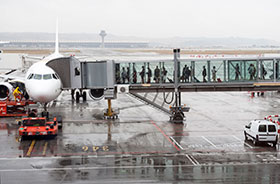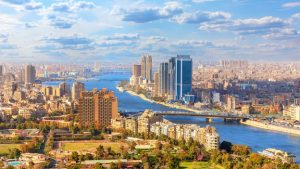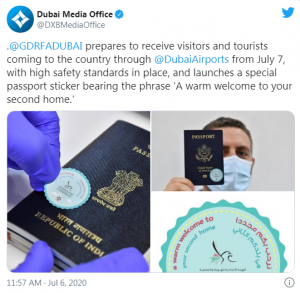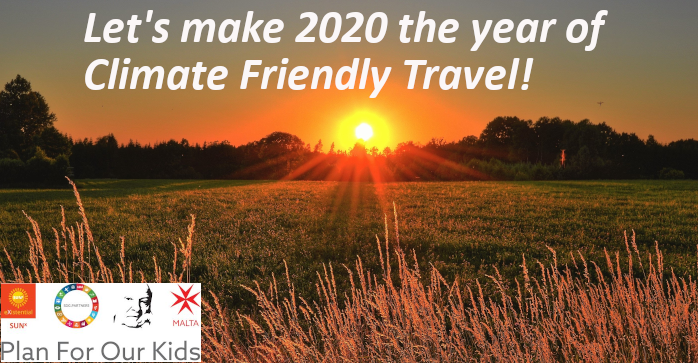Amman – The International Air Transport Association (IATA) urged governments in Africa and the Middle East (AME) to implement alternatives to quarantine on arrival that would allow economies to re-start while avoiding the importation of COVID-19 cases.

Government-imposed quarantine measures in 36 countries across Africa and the Middle East (AME) account for 40% of all quarantine measures globally. With over 80% of travelers unwilling to travel when quarantine is required, the impact of these measures is that countries remain in lockdown even if their borders are open.
“It is critical that AME governments implement alternatives to quarantine measures. AME has the highest number of countries in the world with government-imposed quarantine measures on arriving passengers. The region is effectively in complete lockdown with the travel and tourism sector shuttered. This is detrimental in a region where 8.6 million people depend on aviation for their livelihoods,” said Muhammad Albakri, IATA’s Regional Vice President for Africa and the Middle East.
IATA proposes a layering of measures to protect public health while re-starting aviation, focused in two areas:
- Reducing the risk of imported cases via travelers
- Discouraging symptomatic passengers from traveling with airlines offering flexibility to passengers who need to adjust their schedule.
- Public health risk mitigation measures such as health screening by governments in the form of health declarations.
- COVID-19 testing for travelers from countries perceived to be “higher-risk” when accurate and fast testing is available at scale.
- Mitigating Risk in Cases Where an Infected Person Does Travel
- Reducing the risk of transmission during the air travel journey with the implementation of the Take-Off guidelines published by the International Civil Aviation Organization (ICAO).
- Contact tracing to efficiently isolate any traveler who may become symptomatic and infectious after arrival.
- Reducing risk of transmission at destination through overall government measures to fight the virus.
“Implementing a layered approach should give governments the confidence to open borders without quarantine, and passengers the confidence to fly. Air connectivity is critical to economic and sustainable development in and across AME,” said Albakri.
Effect of COVID-19 on AME
Economies across AME have been devastated by COVID-19, and the aviation industry has been especially hard-hit. Across the region, more than 8.6 million jobs in the airline industry and those businesses supported by aviation are at risk. Thousands of jobs have already been lost due to the shutdown of air traffic.
The latest assessment from IATA Economics shows that the outlook at national level has worsened for major aviation markets in the region since April. For example, the passenger numbers, airline revenue and jobs at risk impacts for the four biggest AME markets have declined across every metric:
| COUNTRY | APRIL -PAX DEMAND | JUNE – PAX DEMAND | APRIL – ARL REVENUE | JUNE – ARL REVENUE | APRIL – JOBS AT RISK | JUNE – JOBS AT RISK |
|---|---|---|---|---|---|---|
|
South Africa
|
-14.5 million
|
-15.61 million
|
-3.02 billion
|
-3.2 billion
|
– 251,100
|
-269,900
|
|
Nigeria
|
-4.7 million
|
-5.32 million
|
-0.99 billion
|
-1.1 billion
|
– 125,400
|
-139,500
|
|
Kenya
|
-3.5 million
|
-3.75 million
|
-0.73 billion
|
-0.8 billion
|
– 193,300
|
– 207,800
|
|
Ethiopia
|
-2.5 million
|
-2.62 million
|
-0.43 billion
|
-0.5 billion
|
-500,500
|
– 530,400
|
|
Saudi Arabia
|
-35 million
|
-36.41 million
|
-7.2 billion
|
-7.4 billion
|
-287,500
|
– 299,200
|
|
UAE
|
-31 million
|
-32.33 million
|
-6.8 billion
|
-7.1 billion
|
– 378,700
|
– 392,900
|
|
Egypt
|
-13 million
|
-13.79 million
|
-1.66 billion
|
-2.3 billion
|
– 205,560
|
– 297,200
|
|
Qatar
|
-3.6 million
|
-1.32 million
|
-1.7 billion
|
-1.7 billion
|
– 53,640
|
– 72,700
|
|
Jordan
|
-3.5 million
|
-3.78 million
|
-0.7 billion
|
-0.7 billion
|
– 34,000
|
– 36,660
|
Download the full list of selected Africa countries (pdf) full list of selected Middle East countries (pdf)
See AME Media Briefing presentation by Muhammad Ali Albakri, IATA Regional Vice President for Africa & the Middle East
للمزيد من الدول في الشرق الأوسط، اضغط هنا.
For more information, please contact:
Corporate Communications
Tel: +41 22 770 2967
Email: corpcomms@iata.org
Notes for editors:
- IATA (International Air Transport Association) represents some 290 airlines comprising 82% of global air traffic.
- You can follow us at https://twitter.com/iatafor announcements, policy positions, and other useful industry information.










